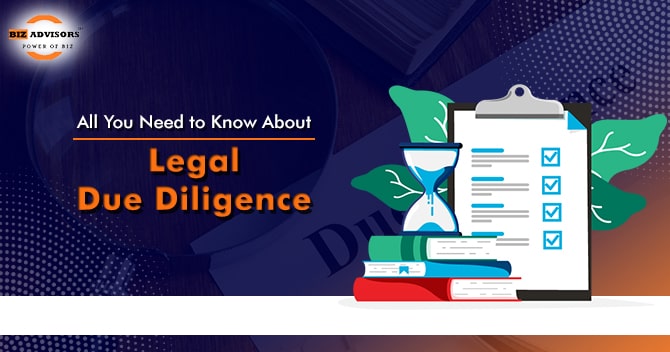The reviewing of the legal, financial and compliance aspects of a business is due diligence and looking separately at the legal aspect would constitute Legal Due Diligence. But what is due diligence and why is it necessary?
Due diligence consists of factual, background, legal, and accounting checks. This is at the option of the company or investors to be conducted in order to judge the company afterall they are investing in the company. It is also conducted before any private equity investment business bank loan funding, etc. There are three types of due diligence – Business due diligence, Legal Due Diligence and Financial due diligence.
What is Legal Due Diligence?
The process of investigating into the legal affairs of a prospect’s business is known as Legal Due Diligence. Looking into the legality of the overall functioning of a business, starting from its employees its investors is referred to as Legal Due Diligence. The foremost aim of conducting it is to ensure that the prospect business aside from a profitable stride has a lawful background and no illegal discrepancies. While Legal Due Diligence is generally an investigation conducted by one company on another company, one is interested in buying or investing or interacting with in any manner in respect of its business, it can also be conducted on one’s own company.
Areas Covered Under a Legal Due Diligence
Today, the law has a number of faces and takes up different faces. Legal Due Diligence can cover the following things metioned below-
- Intellectual Property
This includes copyright, trademarks, patents and trade secrets. This makes sure there is infringement in any of the kinds of intellectual property. The licenses issued regarding each are analyzed.
- Company Establishment
This includes the company structure. The company’s incorporation, the memorandum of association and the articles of association are examined to gather information about the aims and objectives of the prospect company.
- Employee Contracts
This helps understand the condition of the employees of the prospect company, their conditions and the risk involved. This provides an idea regarding the liability towards the employees that will be arising later. The employee contracts also include the contracts related to their insurance, salaries, employment periods, pensions, etc. this also includes health and safety standards that are to be maintained in a working environment.
- Tax Liability
This includes the accounts and the taxes of the company, if there is and discrepancy existing or not.
- Litigation
This provides details for all the present and past litigations the company was involved in. this helps understand the company’s litigation strategy to avoid any problems in the future.
- Environment Laws
It is also to be seen that the company is not against anything prescribed by the environmental laws.
Conducting Legal Due Diligence
Legal Due Diligence involves three basic steps which are given below-
- Preparation
A working business has a huge number of aspects that can be looked into. The preparation part is where a business sets its goals and priorities. Before conducting a Legal Due Diligence a company needs to clear a checklist of whether a prospect company fulfils all the requirements or not. The preparation stage involves planning and strategizing diligence. It focuses on what are the requirements for conducting diligence, the document required to be requested in the case of a private company and what documents are to be taken from the public domain in the case of a public company. All documents regarding existing investors and shareholders[1], the employees, its incorporation, license and all other documents are required for Legal Due Diligence.
- Analysis
The documents collected and furnished are then analyzed to see the compatibility between the companies or the standard to the discretion of the investors to give the final decision. The legal documents, permits and any other documents required are discussed and studied with the company for their clarification.
- Results
The last step in a diligence process is the presentation of the diligence report. The results are discussed and the concerns are put forward with the suggested solution. Keeping in regard the concerns of companies and the priorities the transaction moves forward accordingly.
Advantages
Conducting Legal Due Diligence helps in thw following-
- In understanding the working of the prospect company
- Determining the accuracy of the transaction
- Identifying legal risks
- Establishing necessary legal boundaries
Conclusion
Though Legal Due Diligence is a complex process, ensuring a company is making the right decision is an important step. This help clear all the legal grey areas that might create problem later on. Investigating the prospect company’s Memorandum of Association and Articles of Association allows for understanding what the company is about. Not only these but the documents prepared by the prospect company also contribute to clearing any doubts in the minds of the parties. This helps in directing proper investments and allocating risks in a company. Further aspects and queries can be solved at Bizadvisors.
Read our article:Benefits of RCMC Registration in India
 9559179325
9559179325 9559179325
9559179325





